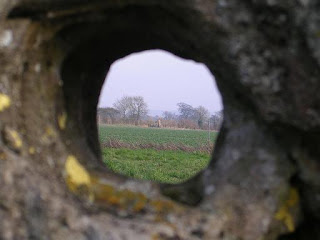
 Everyone has heard of Stonehenge, but a lot of people don't know that the British Isles are home to nearly 1000 other stone circles. Even more have been lost to time. Archaeologists argue about what they were for. Many seem to have astronomical alignments, and they certainly played a big part in prehistoric religion. They were created during the Neolithic and Early/Middle Bronze Age (from about 4000 to 1500 B.C.).
Everyone has heard of Stonehenge, but a lot of people don't know that the British Isles are home to nearly 1000 other stone circles. Even more have been lost to time. Archaeologists argue about what they were for. Many seem to have astronomical alignments, and they certainly played a big part in prehistoric religion. They were created during the Neolithic and Early/Middle Bronze Age (from about 4000 to 1500 B.C.).
One of my favorites is the Rollright Stones, in Oxfordshire. Last year I took a ten mile hike through beautiful (but muddy!) countryside to see them. It's hard to get a complete view of the site, since it's actually three clusters of stones. There's a circle of 77 stones called The King's Men, and nearby stands a curved single monolith called the King's Stone. Not far away are a group of five stones leaning on one another called the Whispering Knights.
The stones got these names according to legend a king and his knights were turned to stone by a witch. The Whispering Knights were leaning towards one another because apparently they were conspiring against their sovereign when they got petrified.
One of the King's Men, in the main circle, has a hole through which you can get a clear view of the Whispering Knights. This has led to all sorts of speculation, but nobody's really sure what it all means.
through which you can get a clear view of the Whispering Knights. This has led to all sorts of speculation, but nobody's really sure what it all means.
The site was built over a long period of time. The Whispering Knights are actually the partially collapsed remains of a Neolithic burial chamber. The King's Men might have been built a bit later. The King's Stone seems to mark a Bronze Age cemetery, and came last.
The whole association with a king may be a very old memory of a true story. Burial chambers were hard to build, requiring a lot of manpower to haul the big stones and then cover them with earth, so the person buried there was probably a chief or king. The fact that the spot was still being used for burials two thousand years later show how important the place was. Sadly, the Rollright Stones have been subject to a lot of vandalism in recent years. Some idiot spray painted a few of the stones yellow, and another idiot put a burning tire on the King's Stone. It seems a lot of modern people are determined to wreck the countryside and anything that hints of any association with the past.
Sadly, the Rollright Stones have been subject to a lot of vandalism in recent years. Some idiot spray painted a few of the stones yellow, and another idiot put a burning tire on the King's Stone. It seems a lot of modern people are determined to wreck the countryside and anything that hints of any association with the past.
If you go, please respect the stones. You can get information on how to get there from the Oxford Tourist Information Centre. The best way is to get a local bus to Chipping Norton and walk the rest of the way. If the weather's good, you'll pass nice views, including a country church.
Looking for Sean McLachlan? He mostly hangs out on the Civil War Horror blog these days, but feel free to nose around this blog for some fun older posts!
You can also find him on his Twitter feed and Facebook page.
You can also find him on his Twitter feed and Facebook page.
Wednesday, 19 March 2008
The Rollright Stones
Labels:
England,
megaliths,
Oxford,
preservation,
stone circles
 Stumble it!
Stumble it!
Subscribe to:
Post Comments (Atom)
















No comments:
Post a Comment